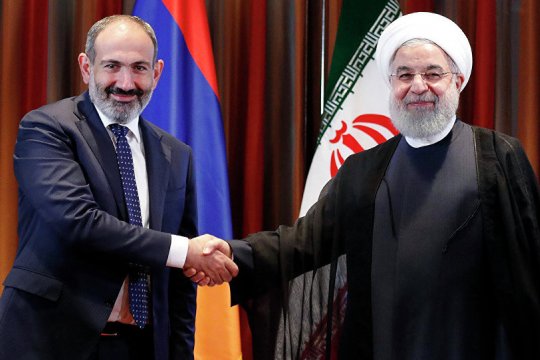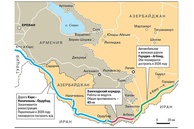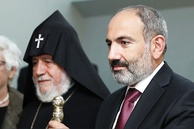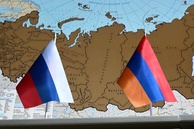Some experts believe that Iran’s cooperation with Armenia could become costly for the latter owing to the ever increasing hostility demonstrated by US President Donald Trump towards the Islamic Republic of Iran. They predict that American sanctions and extensive pressure on Iran could throw Armenia into a kind of blockade.
What comes to mind in connection with this is the words that are thought to have been said by Napoleon Bonaparte: geography is destiny. Even though it could not always be the case but it definitely is with the Caucasus. There are few if any regions whose military, strategic and economic significance would combine with unprecedented ethno-religious diversity on a fairly small territory with historically conditioned disputable issues. This naturally creates all the conditions for an atmosphere of permanent tension which over the last two centuries has repeatedly exploded in armed conflicts and wars.
In the 21st century, the situation in the Caucasus is formed by a most sophisticated political gamut of bilateral and multilateral relations among three former Soviet republics of Transcaucasus - Azerbaijan, Armenia and Georgia, and also, not in the last place, by the Caucasian states of Russia, Turkey and Iran. Besides, one should not forget about the military and political influence of non-regional countries, first of all, the United States, the European Union and Israel.
Undoubtedly, today we are witnessing the influence of multiple forces in different areas of Caucasian politics, and these forces are dragging Caucasian states into various alliances. Moreover, the regional policy of each of the South Caucasian states is determined by a variety of factors that spring from the specifics of bilateral and multilateral relations.
But we will not analyze the whole spectrum of complicated and entangled relations between groups of countries and within groups proper. We will focus on relations beween Iran and Armenia.
What is the role of Armenia, taking into account the US anti-Iran sanctions?
Iran is the largest multi-ethnic state in the Middle East. Presentday Iran is home to more than 40 nationalities, each at a different level of socio-economic development. The multi-million population of Iran is ethnically related to the peoples of the Transcaucasus and Central Asia, the Middle East, and South Asia.
For centuries, Iran has been maintaining close economic and cultural ties with the peoples of the Transcaucasus. But its relations with Armenia stand out as somewhat specific.
Significantly, the first state formations of Armenia and Iran appeared in the VII - VI centuries BC, that is, nearly 3 thousand years ago. Since then their territories and regimes have undergone numerous changes, but Armenians and Persians, as state-forming ethnic groups, have passed through the centuries unchanged.
An idea which is deeply rooted in both the Iranian and Armenian consciousness is that Persians and Armenians boast ancient culture that cannot be thrown into oblivion. This explains cultural ties between the two nations and a comprehensive respect for the specifics of each other’s national and religious mentality.
At present, Iran is home to more than 200 thousand Armenians. Iranian Armenians enjoy substantial rights. Under the Constitution of Iran, they have guaranteed representation in parliament and local councils. Not so long ago, Russian Orientalist Karine Gevorkian reported that in 2018, a young Armenian woman was appointed head of the financial department of the Iranian oil company.
The Armenian Christian community is the largest of its kind in Iran. Functioning throughout the country are about 200 Armenian churches and about 30 Armenian schools. Some universities have departments of the Armenian language and culture. Iran publishes books and magazines in Armenian. Also, there are Armenian theatrical, cultural, and sports societies, and the Armenian Club.
It should be pointed out that Iranian Armenians are taking an active part in the social and political life of the country.
Naturally, Iranian Armenians maintain permanent ties with the Republic of Armenia, which undoubtedly cements Iranian-Armenian relations at the state level.
Although Iran and Armenia are not comparable in their scope and position, as history and current geopolitics show, they need each other.
Country | Population (mln.)
| Place in world | GDP (bln. $) | Place in world | GDP per capita (thous. $) | Place in world | Defense spending (% GDP) | Place in world |
Iran | 83.0 | 17 | 1640.0 | 18 | 20.1 | 89 | 5 | 8 |
Armenia | 3.0 | 137 | 28.34 | 136 | 9.5 | 142 | 4.2 | 15 |
(The table is based on data from The World Factbook. CIA)
Iran - https://www.cia.gov/library/publications/resources/the-world-factbook/geos/ir.html;
Armenia - https://www.cia.gov/library/publications/resources/the-world-factbook/geos/am.html)
Iran is interested to maintain ties with Armenia, in the first place, because, as it was already mentioned above, the country is home to an influential Armenian community. Secondly, given that the Armenian diaspora exists in many countries of the world [1], it could become a kind of bridge connecting Tehran with the capitals of other, not always friendly, states where an Armenian community is also active. Also, it is through authoritative Armenian lobbies that Iran could secure favorable political and economic solutions. Thirdly, the territory of Armenia, as a neighboring country, is important for Iran as a corridor to the North (through Georgia) and further to Russia, which is clearly beneficial for Iran considering the current geopolitical situation.
Armenia, in turn, is also interested in friendly relations with neighboring Iran, not only on account of links between the Armenian diaspora and the Islamic Republic of Iran. Iran assumed a fairly balanced position regarding the Nagorno-Karabakh conflict between Armenia and Azerbaijan, by refraining from backing fellow believers from a neighboring country and complying with the Minsk format, the decisions of the Minsk Group (OSCE).
Moreover, the continuing trade and economic ties between Armenia and Iran have become, to a certain extent, a lifeline for Yerevan. Blocked by Turkey and Azerbaijan from two sides, Armenia has only two windows to the outside world: via the borders with Georgia and Iran. Therefore, for Armenia Iran is of vital importance. The Armenian-Iranian border, running through the Araks River, is the shortest for two countries – a mere 35 km. Nevertheless, this border is of great importance, both for Armenia and for Iran, being used for developing trade and economic relations between the two countries and promoting touristm. Statistical data say Iranians (and not only Armenian) enjoy visiting Armenia.
In recent years, Armenia and Iran have seen a successful implementation of various economic programs. One of the first projects was a bridge erected across the Araks River. Also, two high-voltage power transmission lines have been built, a third one is currently under construction.
One of the key areas of economic cooperation between Armenia and Iran is provided by an interim agreement signed in May 2018 between Iran and the Eurasian Economic Union (EAEU) on the creation of a free trade zone. Thus, there have appeared opportunities for merging the 180-million market of the EEU with the 80-million Iranian market. Since Armenia is the only EAEU country that has a land border with Iran, it plays a crucial role in cooperation between the EAEU and Iran, which provides it with an opportunity to develop its relations with Iran.
Undoubtedly, Armenia and Iran’s shared interest in bilateral cooperation envisages good prospects for the future. However, it is not that simple, as there have arrived new times, both for Yerevan, and Tehran.
In 2018 Armenia saw a change of government, as a result of which Nikola Pashinyan was elected Prime Minister. There have been changes in domestic policy. As for foreign policy, at least in relation to Iran, there have been no particular changes and, in all likelihood, there will not be any. Given the present-day conditions, good-neighborly relations between Yerevan and Tehran are not a luxury, but an urgent need.
In this regard, Nikola Pashinyan’s official visit to Iran in February 2019 is of special significance. During the visit the two parties held high-level talks with the participation of Iran's Supreme Leader Ayatollah Khomeini, who rarely receives foreign guests. The negotiations were held in a fairly warm atmosphere, with both sides underscoring the importance of bilateral relations and expressing readiness to exert efforts to develop them.
In the course of above-mentioned talks, representatives of Armenia and Iran signaled the high level of political cooperation, emphasizing yet again that the current level of economic cooperation does not match the full potential of the parties involved. Although by the end of 2018, trade turnover between Armenia and Iran had reached $ 364 million, which is the highest figure since 1991.
Among major projects of the Armenian-Iranian bilateral economic cooperation program is the construction of the third power line, the implementation of the Meghri hydropower project, the North-South highway corridor, trilateral and quadrilateral economic cooperation with Georgia and Russia.
What makes the visit to Iran by Armenia’s Prime Minister Pashinyan special is that Iran is under the US sanctions. In 2018, a transitional year for Armenia, the United States subjected Iran to unprecedented pressure. In addition, the US "secondary sanctions" were imposed against all countries, legal entities and physical persons of foreign countries which dare to maintain relations with Iran. This meant a challenge for Armenia, in many ways economically connected with Iran.
In October 2018, US National Security Advisor John Bolton visited Armenia, Azerbaijan and Georgia to secure support for US plans to further isolate Iran. Reports say Washington is lobbying for the closure of the Armenian border with Iran through opening the border with Turkey.
While in Yerevan, Bolton told Prime Minister Pashinyan that since the United States will pursue the policy of sanctions against Iran, the Armenian-Iranian border is a "big problem." Pashinyan responded by saying the following: “We respect the requests and national interests of any country, but Armenia has its own national interests, which do not always coincide with the interests and ideas of other countries.” But as they say, there could be options.
It is necessary to emphasize that Washington, despite its hostile policy towards the IRI, has always had to tolerate cooperation between Armenia and Iran. Such tolerance is due to the US awareness of the geo-economic situation of Armenia, which, without extensive ties with Iran, will face social and economic problems. In addition, as said before, the Armenian lobby has a lot of sway in Washington, especially in the US Congress, which does not give much say to Iran’s opponents with regard to Armenia. That this is true is confirmed by the absence of any US sanctions against Armenia. That’s why John Bolton all but voiced proposals, and not warnings or threats. Suren Sargsyan, Chairman of the Armenian Center for American Studies, said recently, “Washington is fully aware of the situation and the realities that exist in the region. This means that the United States will never pressure Armenia into rejecting Iran or Russia. And this is good, because Washington knows that we will not survive without Iran and Russia ... "
As is known, besides the United States Iran has another "big friend" - Israel. Apparently, the strengthening of Armenian-Iranian relations is not welcome in Jerusalem, and Yerevan is aware of this. The Armenian diplomacy has taken sophisticated measures to neutralize the negative Israeli reaction. Right after Prime Minister Pashinyan’s visit to Iran, Armenian Deputy Foreign Minister Grigor Hovhannisyan paid a visit to Israel, where he discussed opening an embassy in Israel “in order to bring bilateral relations to a new high”. The Armenian delegation also focused on organizational issues related to the upcoming visit to Israel by Armenian Prime Minister Nikola Pashinyan and Armenian Foreign Minister Zohrab Mnatsakanyan.
In all likelihood, the main point of Prime Minister Pashinyan’s foreign policy agenda and the main goal of his government is tolerance and absence of problems in relations with foreign countries: with Moscow, with Tehran, th Washington, with Brussels, with Jerusalem.
Thus, it is possible to conclude that the change of government in Armenia and large-scale US sanctions against Iran and its partners did not affect the stable nature of Armenian-Iranian relations. In these conditions, the Armenian-Iranian border is unlikely to ever be closed – a complete blockade of Armenia is highly impossible. Moreover, the small Armenia, pursuing a multi-vector foreign policy, has become an important factor in ensuring security in the South Caucasus.
The opinion of the author may not coincide with the position of the Editorial Board.
[1] While in Armenia proper there are just over 3 million Armenians, Armenians in other countries make up more than 8 million. They reside in 55 countries of the world. Their numbers vary from 50 ethnic Armenians in Bolivia, to almost 2 million in Russia. In the US, the Armenian diaspora consists of more than 1.5 million people, in France - 700 thousand, in Turkey (there is no exact data, but presumably from 700 thousand), in Georgia - almost 250 thousand, in Iran - more 200 thousand, in Lebanon - 130 thousand, in Argentina - about 130 thousand, in Syria (before the civil war - 120 thousand), in Ukraine - more than 100 thousand. Significantly, as a rule, Armenian communities in other countries, regardless of their numbers, have a lot of say in the political and economic life of the country of residence. (This data comes from the site “Armenians of the world”, https://arm-world.ru/ludi/204-chislennost-armyan-v-mire.html). According to Zbigniew Brzezinski, the Armenian lobby in the United States is one of the most effective ethnic lobbies in America. (Brzezinski, Zbigniew. “A Dangerous Exemption.” Foreign Policy July 1, 2006: 63)
read more in our Telegram-channel https://t.me/The_International_Affairs

 11:49 04.06.2019 •
11:49 04.06.2019 •



























